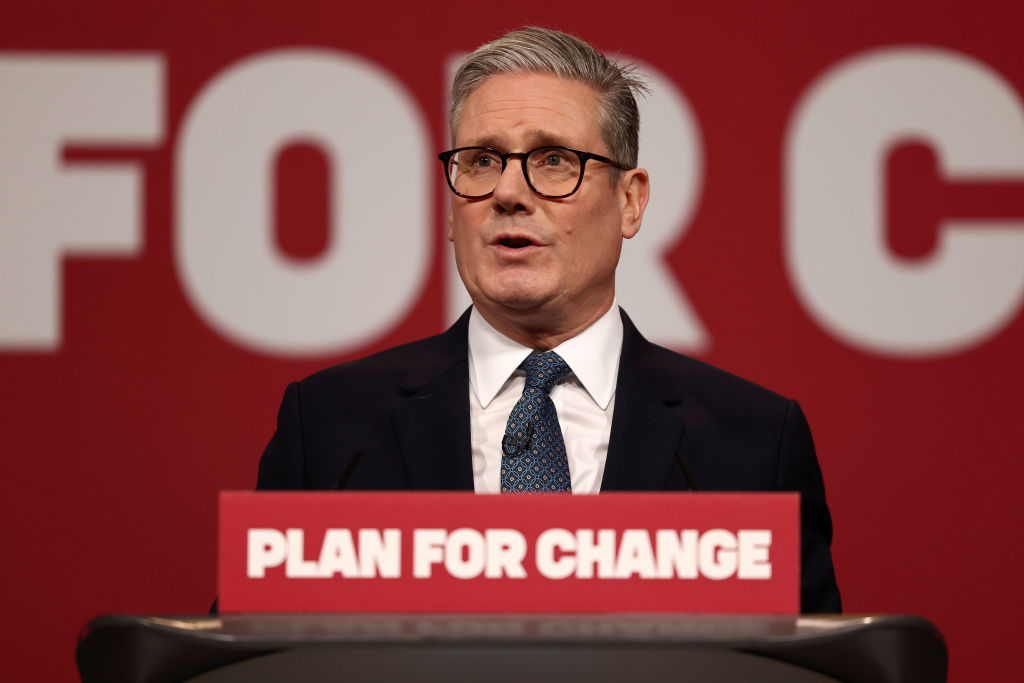Few would claim that Keir Starmer is a great orator. After all, he lacks the fast-talking homilies of Barack Obama, the instinctive banter of Nigel Farage, or the magnetic persona of Donald Trump.
And yet, in a speech delivered at Pinewood Studios near London this morning, the Prime Minister captured the state of Britain’s malaise better than any of his recent predecessors. “You look at our infrastructure,” he said, and “it is clear almost immediately that we have long freeloaded off the British genius of the past. Because we won’t build a future.” Mobilising both nostalgia and at least the possibility of a better tomorrow is the money shot of contemporary politics. Progressives and the Left have long deceived themselves into thinking “hope” is more powerful than anger. Really, you need both.
This is where Starmer’s set of six pledges, or “milestones”, comes in. The first relates to housing, and the target to not only build 1.5 million new homes by 2030 but fast-track decisions on more than 150 major infrastructure projects. The second covers living standards, with the PM promising an improvement in every part of the UK. The third is safer streets, and the ambition to recruit 13,000 more police officers, PCSOs and special constables. Fourth is for 92% of patients in England to wait no more than 18 weeks for treatment. Fifth is the ambition to generate at least 95% clean power by 2030. The last of these pledges was new, aiming for 75% of five-year-olds to start school “ready to learn”.
Of course, some of these will be harder than others. The objective around living standards shouldn’t be especially difficult, while the commitment on zero carbon energy actually represents a downgrade on Labour’s manifesto commitment of 100%. But returning NHS performance to that of a decade ago will be no mean feat, while the ambition for 300,000 new homes a year is unprecedented in recent decades. Notably, however, even that target falls short of what is needed. According to one analysis conducted by the Financial Times earlier this year, Britain needs to build 421,000 new homes before 2036 to keep up with demand. That figure rises to 529,000 if current net migration levels continue.
While rhetoric is not action, it can still be instructive — especially when emanating from a figure as dull as Sir Keir. Franklin D. Roosevelt once asked to be judged by the enemies he had made, a phrase which came to mind as Starmer took aim at a range of targets which at times felt almost Trumpian. If the milestones themselves are about “deliverism”, the rhetoric often felt more akin to a Dominic Cummings Substack post.
Most conspicuous was his repeated targeting of the Civil Service, with the PM claiming his plan would land on desks across Whitehall with “the heavy thud of a gauntlet”. He later insisted that he didn’t think “there’s a swamp to be drained here”; but as the philosopher George Lakoff memorably put it, if someone tells you to not think of an elephant you tend to visualise a large mammal with a trunk. By repeating Trump’s popular phrase, even in the negative, Starmer opened a new line of attack against the permanent state. He was also right in saying that too many in Whitehall are comfortable in the “tepid bath of managed decline”. When someone so colourless says something so vivid, it’s wise to pay attention.
Not having migration among the milestones — eagerly highlighted by Nigel Farage on X today — was notable. But Labour strategists think the Tories are so exposed on the issue under Kemi Badenoch that they can continue to edge those numbers down from record highs and reassess next year. That said, within hours of Starmer’s speech new polling had Reform ahead of Labour in second, and just two points behind the Tories. If that is correct, the Conservatives would win the highest share of the vote despite recording their second-worst result since the 1830s (their worst came in July).
That kind of shift, and specifically the momentum of Reform, explains today’s relaunch. Labour politicians aren’t in panic mode yet, though they know they have wasted incalculable goodwill through episodes like the Lord Alli saga. I’ve been repeatedly told that Morgan McSweeney knows Labour can only win re-election through governing as an insurgent party and waging a permanent campaign while in office. Such an impulse explains Starmer’s targeting of Nimbys and the Civil Service not only in action, but words.
Yet none of this comes easily to a party which is genetically committed to this iteration of the British state, where quangos and judges have more power than elected legislators. That is the thought-world of the Prime Minister and most of his colleagues, and is the only conceivable political project for someone like Sue Gray. All of which raises the question: is Labour closer to Gray or Dominic Cummings in judging the state’s ability to execute change? If it’s the latter, expect a lot more confrontation in 2025.
Such an outcome appears increasingly likely, and thereby reveals that this Labour government is learning a simple truth: in politics, we are all populists now. Particularly if you want to get anything done.











Join the discussion
Join like minded readers that support our journalism by becoming a paid subscriber
To join the discussion in the comments, become a paid subscriber.
Join like minded readers that support our journalism, read unlimited articles and enjoy other subscriber-only benefits.
Subscribe